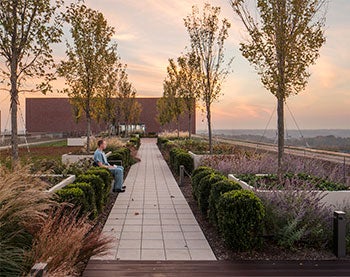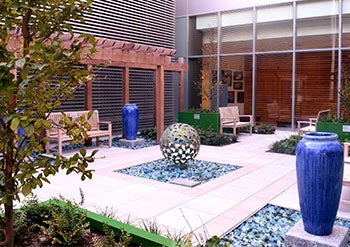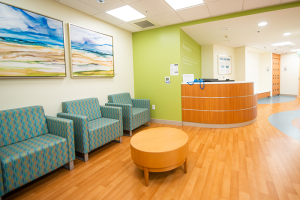More hospitals display nature's healing power
Grassroots environmentalist John Muir proclaimed often the power nature wields to help calm the mind and heal the body. “Everybody needs beauty as well as bread,” he once wrote, “places to play in and pray in, where nature may heal and give strength to body and soul.”
But, if the musings of one radical nature lover are not enough to convince, the oft-referenced work of environmental psychologist Roger Ulrich brings solid evidence of nature’s power to help heal patients. He and his team reviewed medical records of patients at one hospital who were recovering from gallbladder surgery. With all other elements being equal, his team found that patients with bedside windows looking out on trees healed, on average, a day quicker. They also required less pain medication and had fewer postsurgical complications versus those who looked out at a brick wall.

|
| PHOTO CREDIT: TOM ROSSITER
Natural daylight and access to nature for patients and staff played a big role in the design of Christ Hospital's Joint & Spine Center. |

|
| PHOTO BY EDGAR DAVID, SED DESIGN
The University of Pennsylvania Perelman Center for Advanced Medicine wanted to provide a space that would help lower stress in visitors and patients. |
To be clear, researchers say that spending time in a garden won’t cure cancer. But according to Clare Cooper Marcus, professor emerita of architecture and landscape architecture and environmental planning at the University of California, Berkeley, it can bring down stress levels. This, in turn, helps to boost the immune system, engaging the body’s natural resources in healing.
Christ Hospital’s Joint & Spine Center in Cincinnati uses exterior landscape to encourage patients to spend time outdoors during their recovery. A courtyard between the old and new structures incorporates native plantings, pergolas and benches. A green roof garden with views of the city skyline provides a place of respite for both staff and patients.
At the Abramson Cancer Center Pavilion, housed at the University of Pennsylvania Perelman Center for Advanced Medicine, a rooftop serenity garden also offers a place of respite where patients and families can retreat and reflect during the healing process.
It’s well-documented that chaotic, noisy settings can negatively affect patient recovery. If just the opposite is true and leafy green trees can help to answer some of health care’s greatest issues — lowering readmissions and dependency on pain medication — planting some seeds in the ground should be well worth the effort.




